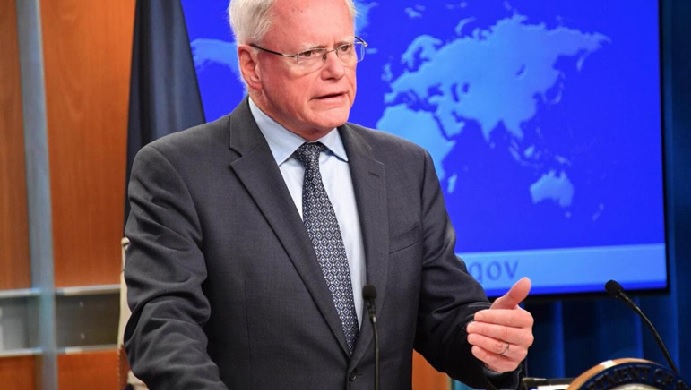
WASHINGTON DC (Kurdistan 24) – Amb. James Jeffrey, US Special Envoy for the Global Coalition to Defeat ISIS and Special Representative for Syria Engagement, briefed journalists on Friday on the meeting of the Foreign Ministers of the Defeat-ISIS Coalition, which was held the day before.
Jeffrey explained that attacks by the so-called Islamic State in Iraq and Syria, what he referred to as the “core,” had shown an uptick during the fasting month of Ramadan.
But compared to last year, the attacks “in terms of numbers” have “dropped significantly” from a year ago, he said, as he called the rise in Islamic State terrorism during Ramadan “typical.”
The Kurdish leadership has repeatedly complained of an Islamic State resurgence in the disputed areas and stressed the need for more effective cooperation between the Peshmerga Forces and the Iraqi Security Forces (ISF.)
Jeffrey expressed that view, as well, as he explained that one of the places in which the Islamic State still operates is “in the fault lines” between the Peshmerga Forces and “the Iraqi army and certain of these militia groups,” an apparent reference to the Popular Mobilization Forces (PMF.)
There are “coordination problems,” between the two sets of local military forces, Jeffrey said.
However, he also noted that the Islamic State operates most openly “in the Badia desert, to the south of the Euphrates.”
“We are concerned about Daesh elements south of the Euphrates in the areas that the [Syrian] regime and its Iranian and Russian supporters control,” he said.
Continued Coalition Commitment, including from NATO
Like Pompeo on Thursday, Jeffrey affirmed the US and broader Coalition commitment to the continued fight against the Islamic State.
He explained that the European members of the Coalition, which have suffered the most spectacular of the Islamic State’s terrorist attacks outside its core area, are “very concerned about Daesh making a comeback.”
“Therefore, they not only are willing to maintain their presence, but also they’re very, very interested in the United States keeping its presence and maintaining the leadership of CJTF-OIR,” he said.
Iraq’s new Prime Minister, Mustafa al-Kadhimi, addressed the conference in a recorded message which explained that although Iraq has had “considerable success against Daesh,” it “continues to need cooperation with the Coalition,” Jeffrey stated, describing his comments as “a very positive set of remarks.”
NATO Secretary General Jens Stoltenberg also addressed the group and “said that NATO is working to take up the request by President Trump that NATO play a bigger role” in “the fight against Daesh, including in Iraq in particular.”
“NATO is well underway to find ways to strengthen the NATO Mission Iraq (NMI),” its “presence and activities, as we go forward,” is how Jeffrey summarized Stoltenberg’s remarks.
US-Iraq Strategic Dialogue
Jeffrey also previewed the “Strategic Dialogue” between the US and Iraq, which will take place on Thursday, over videoconference, because of the coronavirus.
Fawzi Hariri, head of the regional presidency office, will represent the Kurdistan Regional Government (KRG) in the diplomatic discussions.
Jeffrey explained that in the Defeat-ISIS Coalition meeting, Undersecretary of State David Hale, who will lead the US side in the strategic dialogue, had briefly described it.
“What we’re looking for is not simply to talk about coalition troop presence, but also the entire US bilateral relationship,” Jeffrey explained, “under the terms of the 2008 Strategic Framework Agreement,” which was concluded in the last year of the George W. Bush administration.
Support for SDF-run detention camps in Syria
Jeffrey also expressed US confidence in the ability of the Kurdish-led Syrian Democratic Forces (SDF) to control the detention facilities in northeastern Syria for captured Islamic State fighters, as well as the camps housing their wives and children.
“We do believe that they can control those camps, there will not be a major breakout,” Jeffrey said.
“There have been several attempts, and they haven’t gotten very far,” he added.
The SDF holds over 14,000 Islamic State fighters. The overwhelming bulk—some 12,000 prisoners—are from Iraq and Syria. That remains so, even as those who have been released from SDF facilities are largely Iraqi or Syrian—returned to Baghdad for trial or to the Syrian Arab tribes of which they are members.
European countries have generally not taken back their citizens, concerned that they lack the evidence to secure criminal convictions in their own courts.
Last year, Justice Ministers of several European countries considered the possibility of establishing an international court in Iraq to try foreign fighters, but nothing further seems to have come of the idea.
 Eurasia Press & News
Eurasia Press & News



